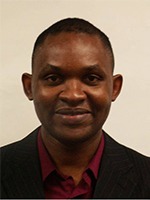Program Information
Global Radiation Oncology Education and Training in Medical Physics Powered by Information and Communication Technologies
W Ngwa1,2*, E Sajo2 , T Ngoma3 , J Dachi4 , J Julius Mwaiselage5 , O kenton6 , S Avery7 , (1) Harvard Medical School, Boston, MA, (2) University Massachusetts Lowell, Lowell, MA, (3) Muhimbili University of Health and Allied Sciences, Dar Es Salaam, TA, (4) Ocean Road Cancer Institute, Dar Es Salaam, Tanzania, (5) Ocean Road Cancer Institute, Dar Es Salaam, Tanzania, (6) University of Pennsylvania, Philadelphia, Pennsylvania, (7) University of Pennsylvania, Sicklerville, NJ
Presentations
SU-F-E-14 (Sunday, July 31, 2016) 3:00 PM - 6:00 PM Room: Exhibit Hall
Purpose:
Recent publications have highlighted the potential of Information and Communication Technologies (ICTs) to catalyze collaborations in cancer care, research and education in global radiation oncology. This work reports on the use of ICTs for global Medical Physics education and training across three countries: USA, Tanzania and Kuwait
Methods:
An online education platform was established by Radiation Oncology Faculty from Harvard Medical School, and the University of Pennsylvania with integrated Medical Physics Course modules accessible to trainees in Tanzania via partnership with the Muhimbili University of Health and Allied Sciences, and the Ocean Road Cancer Institute. The course modules incorporated lectures covering Radiation Therapy Physics with videos, discussion board, assessments and grade center. Faculty at Harvard Medical School and the University of Massachusetts Lowell also employed weekly Skype meetings to train/mentor three graduate students, living out-of-state and in Kuwait for up to 9 research credits per semester for over two semesters towards obtaining their graduate degrees
Results:
Students were able to successfully access the Medical Physics course modules and participate in learning activities, online discussion boards, and assessments. Other instructors could also access/co-teach the course modules from USA and Tanzania. Meanwhile all three graduate students with remote training via Skype and email made major progress in their graduate training with each one of them submitting their research results as abstracts to be presented at the 2016 AAPM conference. One student has also published her work already and all three are developing these abstracts for publication in peer-reviewed journals.
Conclusion:
Altogether, this work highlights concrete examples/model on how ICTs can be used for capacity building in Medical Physics across continents, for both education and research training needed for Masters/PhD degrees. The developed modules and model will be scaled to benefit many more trainees and other developing countries.
Contact Email:

